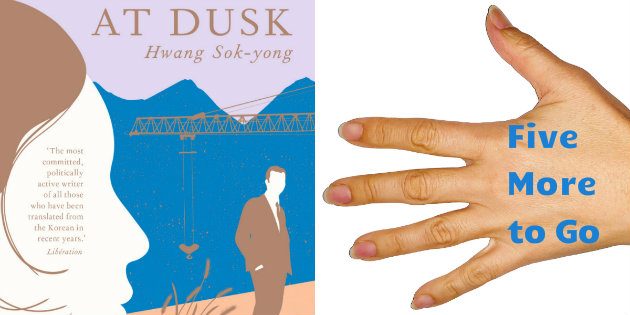17 Jul / Five More to Go: Sok-yong Hwang’s At Dusk [in The Booklist Reader]

 At Dusk by Sok-yong Hwang and translated by Sora Kim-Russell
At Dusk by Sok-yong Hwang and translated by Sora Kim-Russell
In just over a year, three Sok-yong Hwang titles – Familiar Things (2018), Princess Bari (2019), and this novel – have arrived stateside, each indelibly, adroitly anglophoned by Seoul-based Sora Kim-Russell. Lauded by Nobel Prize laureate Kenzaburō Ōe as “undoubtedly the most powerful voice of the novel in Asia today,” Hwang is considered Korea’s most renowned living author. Here he scrutinizes the quiet disconnect of contemporary relationships through the life of a successful, sixtysomething Seoul architect. Park Minwoo escaped his slum childhood through education and opportunity, married well, and rose to be director of a well-regarded firm. Despite such laudable accomplishments, Minwoo now lives alone, separated from his U.S.-domiciled wife and only child, his colleagues few, his friends aging and dying. Then a voice from his past interrupts the isolation of his twilight years . . . the time for reckoning is now.
Like Hwang, other notable Korean writers who explore increasing detachment and ennui are finding resonance with English-speaking readers. Made accessible by enabling translators (#grateful!), here are five additional outstanding Korean novels-in-translation that illuminate the disengaged, disconsolate costs of living in a so-called modern society.
 City of Ash and Red by Hye-Young Pyun and translated by Sora Kim-Russell
City of Ash and Red by Hye-Young Pyun and translated by Sora Kim-Russell
A nameless antihero, known only as “the man,” leaves behind envious fellow employees when he’s transferred to Country C to work at “the main office” of a pest-extermination company. Detained overnight at the airport for being a potential health risk in a nation already plagued by a deadly virus, the man finally arrives at his prearranged apartment in a district built over a reclaimed landfill which is oozing with filthy waste. His suitcase is stolen, including his phone, which severs any connections to his previous life. His attempt to find someone to release the dog he abandoned at home sets in motion a fugitive’s odyssey marked by murder, park-bench wars, sewer hideaways, and rats. Stripped of identity, language, and ethics, the cost of survival for the man proves to be his very humanity. A slap-in-the-face parable of the perils of society’s failures, Pyun’s suffocating tale reveals a future all too possible and real.
 Flowers of Mold by Seong-Nan Ha and translated by Janet Hong
Flowers of Mold by Seong-Nan Ha and translated by Janet Hong
In the titular short story, “Flowers of Doom,” a loner painstakingly studies his neighbors by sifting through their trash – “Garbage never lies” – eventually deciphering the affair that implodes next door in number 507. That same 507 appears in “The Woman Next Door,” in which a new neighbor moves in; she’s single, friendly, and first borrows a spatula from the wife of the family next door, then quickly manipulates possession of the husband and son. Agitated tenants hope to prevent the owner from selling their building in “The Retreat,” but the evening ends in murder. Violence also drives “Nightmare,” in which desperate parents try to convince their daughter that an assault upon her was “all a nightmare.” Ha’s dazzling, vaguely intertwined 10-story collection posits a disturbing, unpredictable, oneiric – yet all too recognizable – world in which heat stifles, waste rots, and bonds break; yet, for most, life just goes on.
 I Hear Your Voice by Young-ha Kim and translated by Krys Lee
I Hear Your Voice by Young-ha Kim and translated by Krys Lee
Kim (Black Flower, 2012) takes readers into Seoul’s grittiest corners, beginning in a bus terminal bathroom stall where a teenager gives birth alone. The baby, Jae, is initially well cared for by a stranger, until drugs rob him of any semblance of family connections. Jae eventually escapes a remote orphanage to return to Seoul’s streets, reemerging as an ascetic surviving on handfuls of uncooked rice. His ascent among the city’s motorcycle gangs is revealed through multiple perspectives, including a once-mute childhood friend, a girlfriend of sorts, and a police officer-sexual predator. Elegantly rendered into English by notable author Krys Lee (How I Became a North Korean), I Hear Your Voice is a wrenching examination of discarded youth, abuses of power, and the irreparable disintegration of societal structures.
 Nowhere to Be Found by Bae Suah and translated by Sora Kim-Russell
Nowhere to Be Found by Bae Suah and translated by Sora Kim-Russell
In Bae’s slim novel, the year is 1988 as an unnamed narrator recounts what happened: “That year was my beginning and my end,” she summarizes. At 24, she’s a college graduate, but thus far has been unable to find more than temporary, dead-end work. She shares a brief, passionless relationship with a young man assumed by others – including both their families – to be her boyfriend. During his short military service, she travels beyond city limits to visit him, only to endure multiple misdirections from less-than-helpful strangers. Her most intimate, revealing interactions happen in her imagination, in dreams, in letters she composes and never actually writes, in potential experiences she never partakes in. Little more than survival happens here, and yet the resulting novel is a profound, universal reflection on our modern lives, our tenuous connections, our unfulfilled intentions, our very own selves that seem “nowhere to be found.”
 The Vegetarian by Han Kang and translated by Deborah Smith
The Vegetarian by Han Kang and translated by Deborah Smith
In Han’s spare, spectacular 2016 Man Booker International Prize-winning novel, a multigenerational, seemingly traditional Seoul family implodes. Yeong-hye, the youngest of three adult children, repeatedly announces “I had a dream” – violent, bloody, surreal – which causes her to stop eating meat; eventually, she eschews everything but water. Her sudden change in diet (vegetarianism remains uncommon in Korea) goes far beyond her own physical metamorphosis, as documented in three distinct sections by her self-absorbed businessman husband, her obsessive video artist brother-in-law, and her distraught shop-owner older sister. While Yeong-hye remains the crux of the disturbing narrative, her voice is rarely heard. Instead, she’s ignored, interpreted, spoken over, and silenced to devastating effect. Han presents family dysfunction amidst cultural suffocation with elegant precision, transforming readers into complicit voyeurs.
Published: “Five More to Go: Sok-yong Hwang’s AT DUSK,” The Booklist Reader, July 16, 2019
